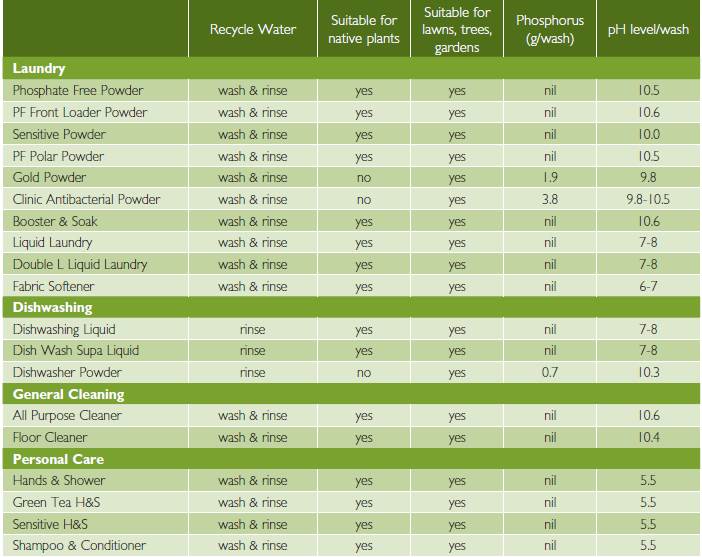Recycle and Reuse Water
Water recycling is generally associated with reuse of grey water.
What is grey water?
Grey water is the waste water from your washing machine, laundry tub, shower, hand basin, and bath - excluding the waste water from your kitchen and toilet. Once seen as waste water, it is now being embraced by many as a source of additional, unrestricted water for the garden, toilet flushing and clothes washing.
Using grey water
Regulations on grey water re-use differ in each state so check with your local council or state Environmental Protection Agency (EPA) before starting your water-saving scheme.
There are few options for grey water re-use: using your grey water directly onto lawn and garden, water diversion or installing a domestic grey water treatment system.
Grey water use is not affected by water restrictions - you can use as much as you like, whenever you like.
Direct reusing
When reusing your grey water directly (without using a water treatment system) you need to pay extra attention to the quality of water and cleaning products you use. To improve the quality of the grey water and prevent any health risks, choose Dominant products marked with the Garden Safe sign. These products are suitable for direct use on to your garden, as they have moderate pH level, low salinity and are phosphate free or low phosphate.
Never reuse water that has been used to wash soiled nappies or domestic pets.
Domestic grey water treatment systems
Contact your state department of health for a list of approved grey water treatment systems and your local council for approval and local regulations.
What makes our products safer to use on gardens?
Many supermarket brand laundry powders contain sodium sulphate which acts mainly as a ‘filler’ to increase the bulk density of the product. Hence a larger dose per wash and more sodium is added to the effluent.
Dominant laundry powders do not contain sodium sulphate or fillers
Many supermarket brand laundry powders often contain as much as 30g/wash sodium ions, which will significantly increase the salt level in the soil when recycling grey water.
Dominant powders contain only 5.5g/wash (except Clinic at 10.8g/wash)
pH is a symbol expressing acidity or alkalinity. The pH scale runs from 0 to 14 with 7 indicating neutral, 0 very acidic and 14 very alkaline. Human skin has a pH of 5.5.
Dominant laundry liquids have a similar pH to human skin, making them gentle on hands and fabrics

10 Easy Ways to Save Water Around the Home
Every day, there are many simple, practical things we can do in the house, when pottering around outdoors or at work to conserve water, save money and help the environment.
1. When Washing
Half fill the sink with hot water and dishwashing detergent to hand wash the dishes. Don’t wash under running water. Run a dishwasher and washing machine only when fully loaded as every load saves up to 17 buckets of water.
2. In the Bathroom
Put a plug in the sink when shaving rather than rinsing your razor under running water. Use
a glass of water when cleaning teeth.
3. In the Shower
Challenge yourself to a maximum 5 minute shower. Install AAA rated water saving shower heads and save on water and energy cost.
4. Toilet Efficiency
Use the half flush and save up to 4 buckets a day. Check for leaks on your toilet by adding food dye to the cistern. If colour appears in a bowl within half an hour, it is time to call the plumber.
5. Plant Selection
Choose water wise plants. Check with your local council which plants are native to your area and most suitable for water and soil conditions.
6. Watering Efficiently
Use watering can or a hose with a trigger nozzle only to water those areas that need it. Add water crystals to soil to enhance water retention by up to 40 percent.
7. Mulching
Applying a layer of mulch at a depth of 7 - 10cm around plants will reduce water evaporation by up to 70 percent.
8. When Cleaning
Always use a broom, rake or a leaf blower rather than a hose to clean driveways and pathways.
9. Keep Weeding
Remove weeds as soon as they spring up - they not only shelter pest but are water thieves too.
10. Cover the Swimming Pool
If you have a pool, use a cover to reduce evaporation.
